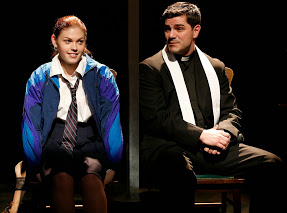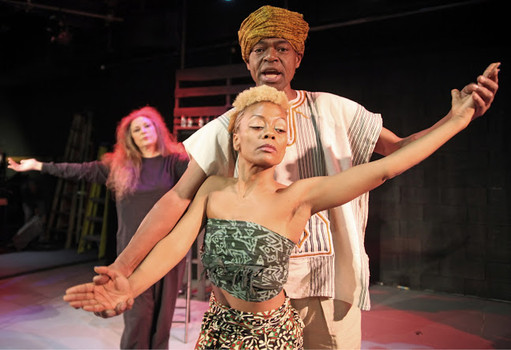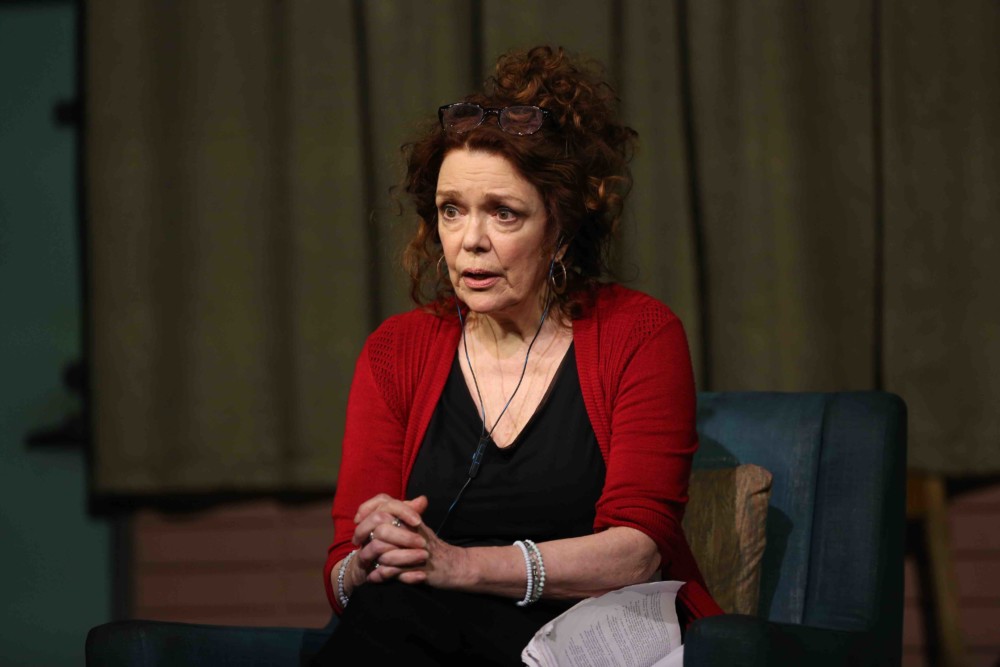
Deirdre O’Connell
EXTENDED THRU APRIL 11, 2020
By Ron Fassler
Lucas Hnath is a playwright who with each new effort continues to surprise his audiences with an imaginative flexibility. His previous efforts include the well-received Off-Broadway plays Red Speedo, which dealt with athletic doping, and The Christians, about a pastor’s crisis of faith as the leader of a mega church. His Broadway debut in 2017 resulted in the Tony Award nominated A Doll’s House, Part 2, which posited what happened many years after Nora Helmer closed the door at the famous finish to Henrik Ibsen’s 1879 masterpiece. And this past season’s Hillary and Clinton brought Laurie Metcalf and John Lithgow to Broadway in an unusual piece that pondered how we look at such well-known figures, with Hnath pushing his fictionalized versions into new positions on a chess board, revealing heretofore undiscovered moves.
Now comes a play of a completely different variety, but no less challenging. First… it’s not really a play. It’s a transcript of a conversation (more of a monologue) that has been cut and pasted together as a dramatic story. It is told entirely in the words of Dana Higginbotham, the playwright’s mother, and does she have a story to tell. The interviews, conducted by Steve Cosson— a friend of Hnath’s and a fellow dramatist and director— not only use the actual words, but the actual voices of the two participants. The 75-minute play that unfolds, beautifully directed by Les Waters, is 90 percent in the voice of Dana H.— theatrically embodied by the actress Deirdre O’Connell, who relinquishes her own speaking voice to that of the playwright’s mother. That’s right: She lip-synchs the entire performance. It’s an arresting and astonishing achievement that may not be to everyone’s taste, but it’s one I found absolutely riveting.
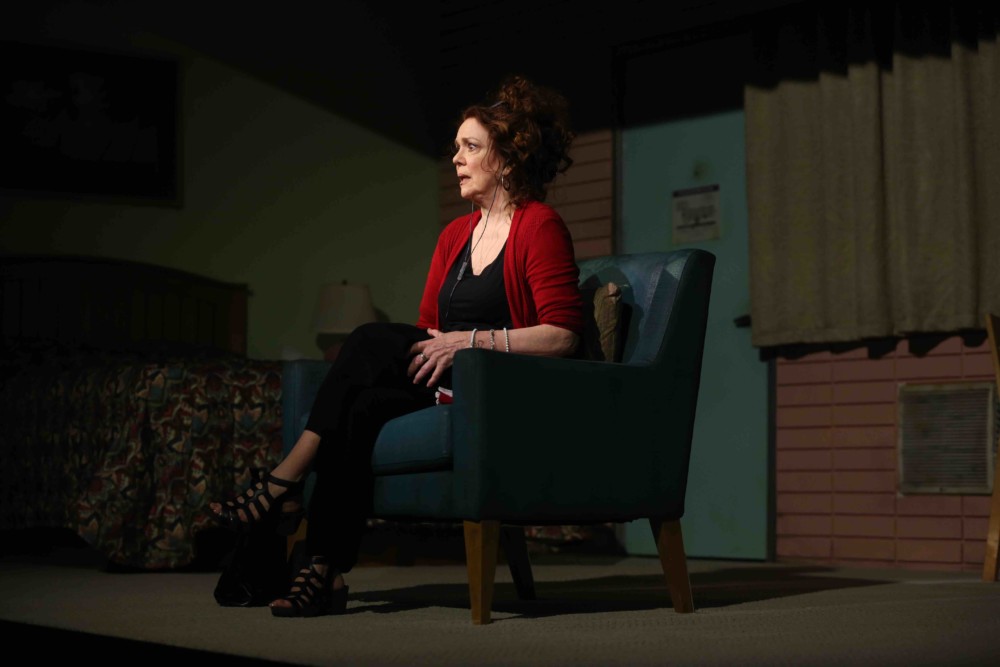

Deirdre O’Connell
Wearing a hearing device, and often utilizing a click track (much like actors use when dubbing a soundtrack to a film), makes for a bizarre dramatization— though one which we become accustomed to rather quickly. Almost like Sam Mendes’s recent film 1917, which was shot as if to appear as one continuous take in order that it be presented with urgency, Hnath offers a somewhat similar effect with storytelling so gripping that you quickly forget about the unique set-up and instead fall down the rabbit hole of the extraordinary tale that unfolds. How his mother survived a five-month abduction at the hands of a member of the Aryan Brotherhood she calls “Jim” is not for the weak of heart. The harrowing treatment she went through, and its prolonged aftermath, are the subject of the play. “You adapt to maladaption,” she says.
Educated with a master’s and Ph.D., Dana Higginbotham was a non-denominational chaplain at a hospital in the deep south whose job it was to offer words of comfort to convicted felons before their executions, among other equally difficult duties. However, these skills proved not to be enough to get her through her own kidnapping by a former felon: Not only is she a victim of a perverse and deadly adversary, but in a bizarre commingling of incidents, Higginbotham begins to believe that Jim might actually be protecting her. This is where we begin to suspect that she may not be all that reliable a narrator. And with the play entirely in her own words, Hnath purposely leaves it at just that. He is an off-stage character in the play, as he was a student at NYU when all this was happening, which means his presence is not really felt. This does lead to some confusion, which I found not only troublesome, but problematic, due to its raising questions for which we do not get any answers.
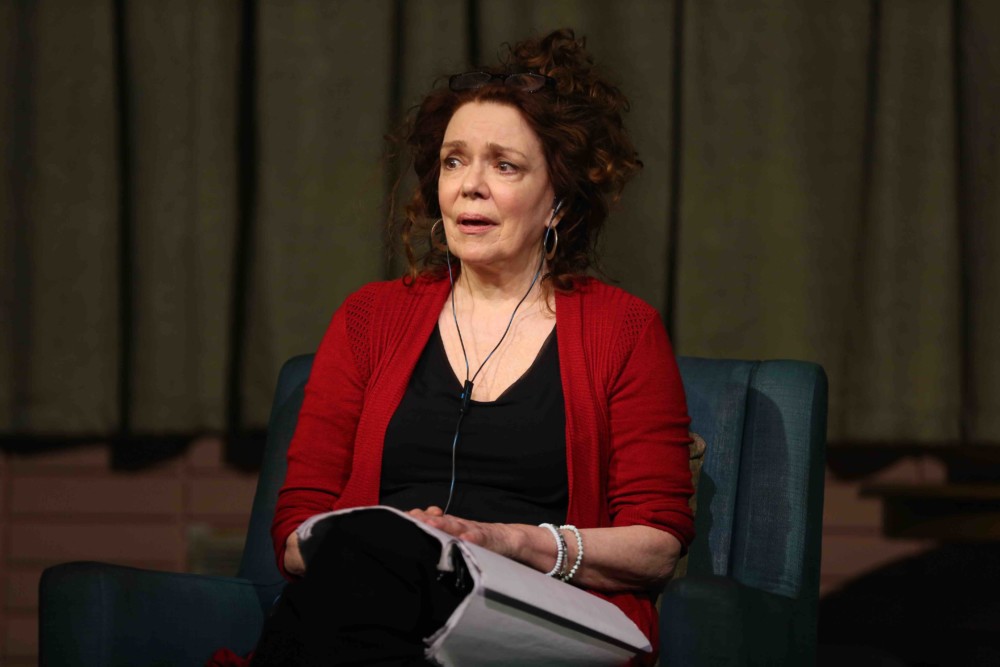

Deirdre O’Connell
But nothing can be taken away from Deirdre O’Connell’s extraordinary achievement in portraying this character. We are treated to every sound on the tapes that came from these interviews— meaning each pause, breath, cough, and occasional weeping— all of which she must pull off with the exact timing of Higginbotham’s own delivery. How O’Connell achieves this is miraculous and undoubtedly due to a rigid rehearsal process that must be second nature to her by now. Having played the role in two prior productions— both its world premiere at the Kirk Douglas Theatre in Los Angeles in June 2019 and another run at Chicago’s Goodman Theatre— she has mastered this technique and tethered it to a fierce emotionality.
Now that it’s opened at the Vineyard Theatre near Union Square, with a run already extended for one additional week through March 29th, it would be wise to get tickets immediately. Fair warning though: The journey into the void of Dana H. left me deeply shaken. It is unlike any play I’ve seen in a lifetime of theatergoing. To me that’s not only a good thing, it’s a great one.
Photos: Carol Rosegg
Dana H.
At the Vineyard Theatre – 108 E. 15th Street, NYC
Through March 29th



